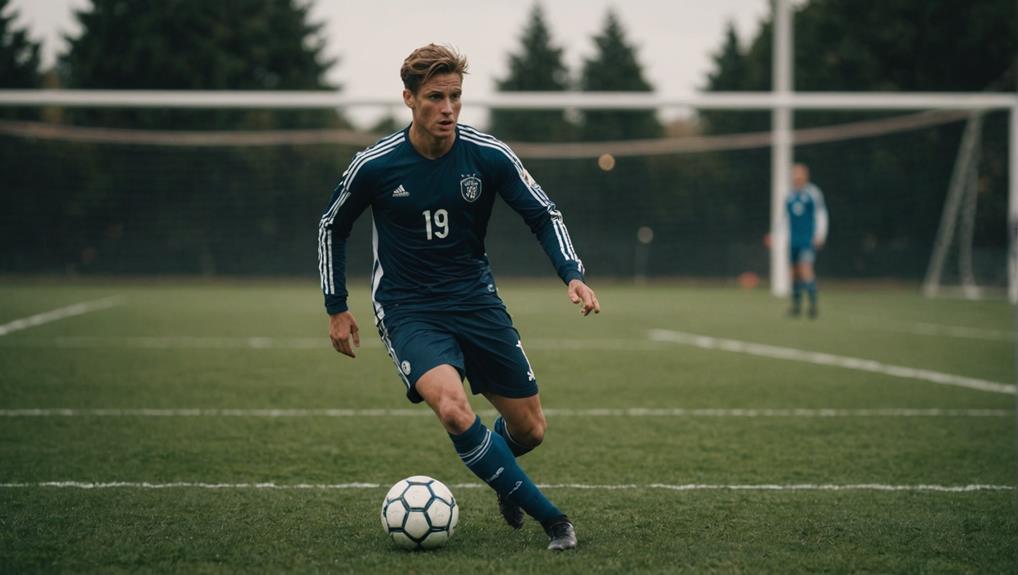
How to Defend in Soccer: Techniques and Strategies
July 11, 2024To defend in soccer, focus on mastering defensive positioning fundamentals. Cut off passing lanes and stay compact as a unit. Communication and coordination are key for solid defense. Keep close to opponents and anticipate their moves. React quickly to changing situations. Different positions have unique roles in defense. Stay mentally tough with sharp focus. Learn advanced interception and tackling techniques. Study professional defensive strategies for insights. Keep honing your defensive skills for a rock-solid defense.
Defensive Positioning Fundamentals
To excel in defending in soccer, mastering defensive positioning fundamentals is essential. Defensive positioning involves anticipating opponents' movements, cutting off passing lanes, and staying compact as a defensive unit.
Understanding the opponent's position and movement patterns is key to effectively adjusting your positioning on the field. By limiting space for the attackers and constantly adjusting your defensive stance, you can disrupt the opponent's offensive plays.
To anticipate your opponents' movements effectively, observe their positioning and movement patterns. By predicting where they might pass or dribble, you can proactively adjust your positioning to intercept the ball or block passing lanes.
Staying compact as a defensive unit is critical to deny the opposition space to exploit. As the ball and opponents move, be sure to constantly adjust your defensive positioning to maintain the best distance and coverage.
Mastering these defensive positioning fundamentals will greatly enhance your ability to thwart the opponent's attacks.
Communication and Coordination Techniques
Effective communication among defenders is a cornerstone of maintaining defensive organization and preventing gaps in coverage. Coordination in defense involves understanding teammates' movements, anticipating plays, and providing support when needed.
Clear and concise communication can help in organizing defensive lines, marking assignments, and overall defensive strategy. Coordination between defenders ensures smooth shifts, covers spaces effectively, and minimizes defensive errors. Proper communication and coordination can lead to a cohesive defensive unit that can effectively shut down opponent attacks.
To enhance communication and coordination among defenders, it's essential to constantly talk to your teammates on the field, providing them with relevant information about the game's dynamics. Additionally, always be aware of your positioning in relation to your fellow defenders to guarantee proper coverage. Remember to communicate marking assignments clearly and be vocal during defensive adjustments to maintain a strong and cohesive defensive line.
Effective Marking and Pressing Strategies
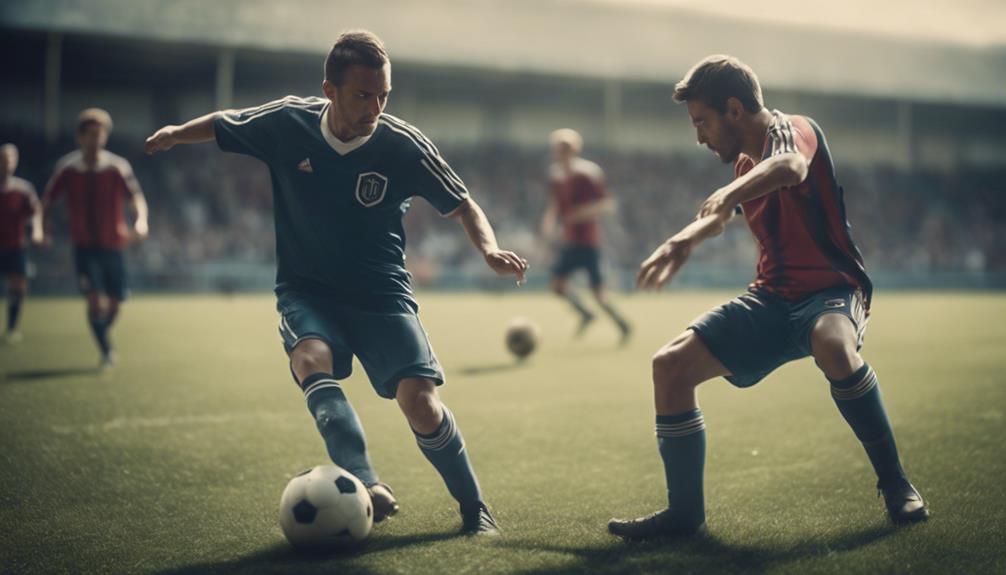
Staying close to your opponent and anticipating their moves are key elements of effective marking and pressing strategies in soccer. Defensive success hinges on disrupting the opponent's play by applying pressure at the right times. Timing plays a critical role in both marking and pressing, denying opponents space and time to make decisions.
Understanding when to employ man-marking or zonal marking is essential for a well-rounded defensive approach. Man-marking involves sticking tightly to a specific opponent, while zonal marking focuses on defending areas of the field.
Additionally, high pressing is a proactive strategy where players push up the field to win the ball back quickly in the opponent's half. This aggressive approach can lead to turnovers, creating potential counter-attacking opportunities.
Anticipation and Reaction Skills
Improving your anticipation and reaction skills is vital for becoming a proficient defender in soccer. Anticipation skills allow defenders to predict opponents' moves and intercept passes effectively, giving you an edge in disrupting the opposing team's attacks.
On the other hand, reaction skills are essential for quickly adjusting to changing game situations and responding to attacks promptly. By reading the game and anticipating opponents' actions, defenders can position themselves strategically and make well-timed interventions. Quick reactions are key in closing down space, blocking shots, and executing successful tackles.
To enhance these abilities, dedicate time to drills, practice sessions, and gaining game experience. By honing your anticipation and reaction skills, you'll not only improve your individual defensive performance but also contribute significantly to your team's overall success on the field.
Individual Defensive Roles in Soccer
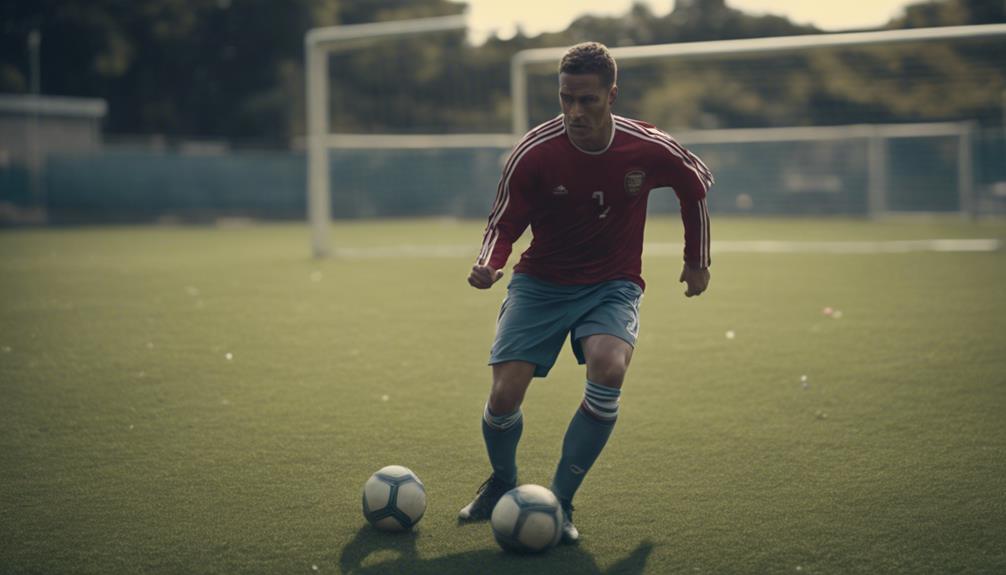
Understanding the roles of individual defenders is essential for a well-organized and efficient defensive system in soccer.
Center-backs play a pivotal role in anchoring the defense, focusing on marking strikers, and excelling in winning aerial duels.
Full-backs provide essential defensive cover on the wings, support attacking play, and help maintain defensive shape across the backline.
Defensive midfielders act as a shield for the defense, breaking up opposition attacks, and efficiently distributing the ball to initiate counter-attacks.
Wing-backs, on the other hand, offer width in formations with a back three, track back to support defensively, and actively participate in transitions from defense to attack.
Each player in these individual defensive roles contributes uniquely to the team's defensive efforts, creating a cohesive defensive unit that can effectively thwart opposition attacks and maintain a solid defensive structure throughout the game.
Drills for Defensive Proficiency
Engage in targeted defensive drills to enhance your proficiency in key aspects of defending in soccer.
Defensive drills are important for improving skills such as marking, tackling, and positioning. These drills not only focus on individual abilities but also help in developing communication, coordination, and decision-making within the defensive unit.
Specific exercises are designed to work on areas like one-on-one defending, set-piece defense, and counter-pressing, which are essential components of a solid defensive strategy.
Marking: Practice drills that simulate marking opponents closely to prevent them from receiving the ball effectively.
Tackling: Work on tackling drills to improve your ability to win the ball back from opponents cleanly and effectively.
Positioning: Enhance your defensive positioning through drills that emphasize maintaining the right distance from opponents and covering critical areas on the field.
Communication: Incorporate drills that require constant communication with teammates to make sure everyone is coordinated and aware of their defensive responsibilities.
Tactical Approaches for Solid Defense
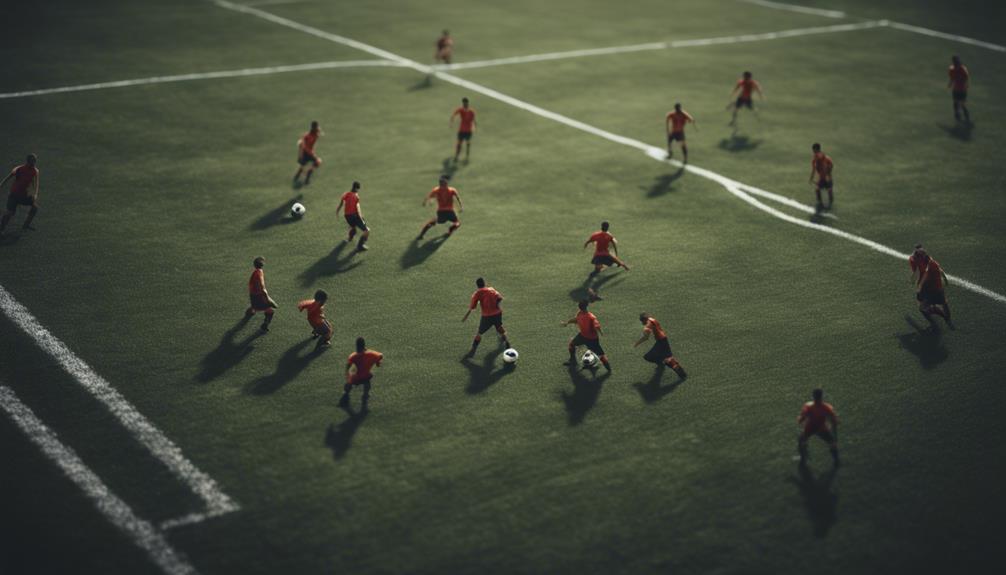
To establish a solid defense in soccer, mastering tactical approaches is key for effectively thwarting opponents' attacks and securing your team's goal. Understanding defensive formations such as the 4-4-2 or 3-5-2 can help in organizing your team's defensive structure efficiently.
Additionally, knowing the distinctions between zonal marking and man-marking systems can greatly influence your defensive strategies. Implementing a high press defense involves a proactive approach to disrupt opponents' build-up play and win the ball back quickly in advanced areas.
On the other hand, utilizing a low block defense and focusing on counter-attacking can be effective in frustrating opponents and exploiting turnovers. Emphasizing swift changes from defense to attack is vital to maintain pressure on the opposition and catch them off guard.
Psychological Aspects of Defensive Play
To excel in defense, you must cultivate mental toughness, maintain unwavering focus, and handle pressure effectively. These qualities are essential for staying composed and making quick decisions under challenging circumstances on the field.
Strengthening your resilience and confidence will help you navigate the psychological demands of defensive play with ease.
Mental Toughness in Defense
Cultivating mental toughness in defense is essential for soccer players to excel in handling pressure situations effectively.
When it comes to defending, developing mental resilience and concentration is key. Defenders must have the confidence to trust their abilities and make quick decisions under pressure.
Decision-making is pivotal in defensive play, requiring players to remain calm and focused in high-stress moments during matches.
Additionally, fostering team cohesion and a collective defensive mindset is crucial for seamless coordination among defenders to achieve common goals.
Utilizing visualization techniques for psychological preparation allows defenders to mentally rehearse various defensive scenarios, ensuring they're mentally prepared for the challenges they may face on the field.
Focus and Concentration
Maintaining sharp focus and unwavering concentration is crucial for defenders to anticipate opponents' movements and react swiftly in soccer matches. The ability to stay mentally tough and resilient in challenging situations can greatly impact defensive performance.
By honing your focus and concentration skills, you can enhance your anticipation of the opponent's next move, allowing you to react effectively and disrupt their attacks. Confidence plays an essential role in decision-making under pressure, enabling defenders to make split-second choices with conviction.
Effective communication among defensive teammates is key to coordinating movements and maintaining defensive solidarity. Solid defensive coordination relies on a shared understanding and cohesive teamwork to thwart opposing threats.
Therefore, fostering a culture of focus, concentration, anticipation, reaction, mental toughness, resilience, confidence, communication, and coordination is critical for a successful defensive strategy in soccer.
Handling Pressure Effectively
How can defenders effectively manage pressure in soccer matches to enhance their defensive performance? Handling pressure effectively requires mental toughness, resilience, and strong decision-making skills.
Here are some strategies to help you stay calm and focused in high-pressure situations:
- Develop Mental Toughness and Resilience: Building mental strength will help you cope with the demands of intense defensive moments.
- Enhance Decision-Making Skills: Improving your ability to make quick and effective decisions under pressure is crucial for successful defensive play.
- Foster Team Cohesion and Collective Mindset: Working together with your teammates and sharing a common defensive approach can provide support during challenging situations.
- Utilize Psychological Preparation and Visualization: Engaging in mental preparation techniques, such as visualization, can boost your confidence and readiness to handle pressure effectively.
Advanced Techniques for Defenders
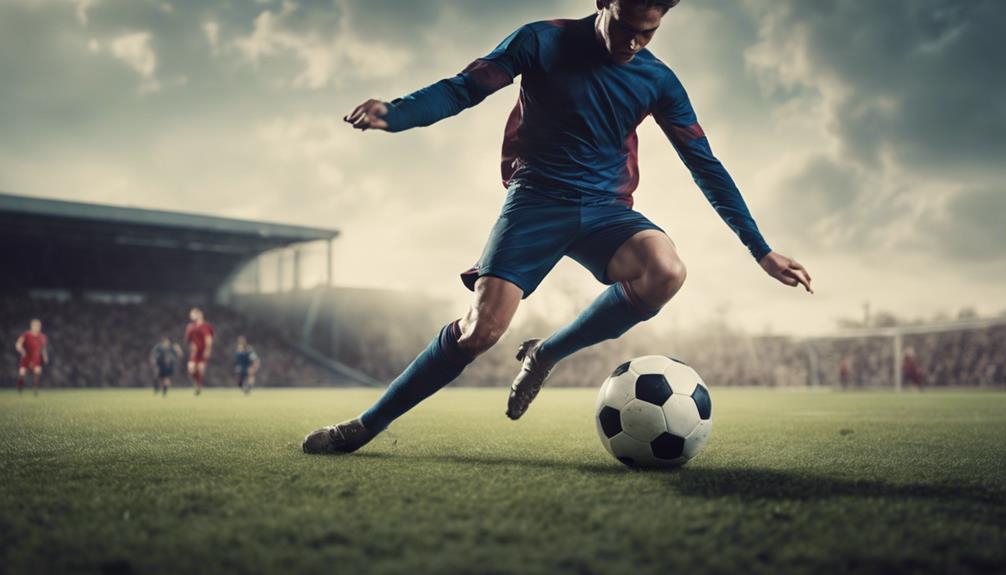
To advance your defensive skills in soccer, focus on mastering interception and anticipation techniques to effectively disrupt your opponents' passing game. Advanced defensive techniques for defenders also involve honing your tackling skills, ensuring proper timing, maintaining a low center of gravity, and using body shielding effectively.
Enhancing set-piece defense requires attention to positioning, anticipation, and studying opponents' tendencies during corner kicks and free kicks. Coordinated defensive strategies, including implementing offside traps and analyzing opponents' attacking patterns, are essential for a strong defensive line.
Goalkeepers, playing an important role in defense, must excel in communication, decision-making in 1v1 situations, and possess physical attributes like speed and strength. By focusing on these aspects—interception skills, anticipation skills, tackling techniques, set-piece defense, coordinated defensive strategies, offside traps, goalkeepers' communication, defenders' positioning, and analyzing opponents' patterns—you can elevate your defensive performance on the soccer field.
Learning From Professional Defensive Strategies
Explore various professional soccer teams and players to gain insights into effective defensive strategies and techniques. By studying teams like Real Madrid, Chelsea, and Liverpool, you can observe different defensive strategies employed at the highest level.
Analyze the approaches of elite defenders such as Virgil van Dijk, Sergio Ramos, and Kalidou Koulibaly in various defensive situations to understand their decision-making and positioning. Learn from top coaches like Diego Simeone, Pep Guardiola, and Jurgen Klopp about defensive organization and systems that contribute to a solid defense.
Watch Match Highlights:
Observe how professional teams handle defensive adjustments and set-piece situations to learn from their execution.
Follow Defensive Trends:
Stay updated on defensive trends in leagues like the Premier League, La Liga, and Serie A to adapt and improve your defensive strategies accordingly.
Conclusion
To sum up, mastering defensive techniques in soccer requires a combination of skill, strategy, and teamwork. Remember to focus on positioning, communication, and anticipation to effectively shut down opponents.
Did you know that in the 2018 FIFA World Cup, France only allowed four goals in seven matches on their way to winning the tournament? Studying the defensive tactics of top teams can help you improve your own skills on the field.
Keep practicing and never stop learning!


